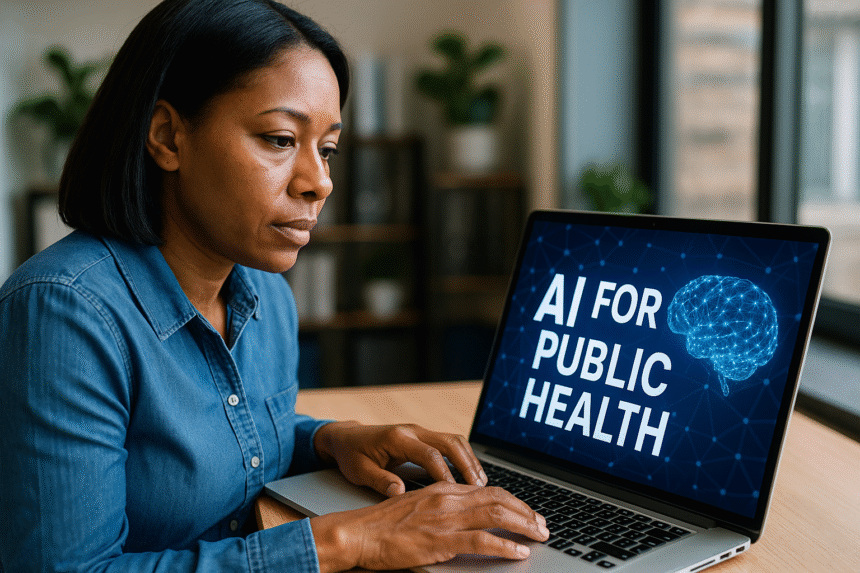Key Highlights:
- The Indian government is leveraging Artificial Intelligence (AI) to enhance public health surveillance, ensuring quicker disease detection and efficient resource allocation.
- Initiatives such as the Ayushman Bharat Digital Mission (ABDM) and the establishment of AI Centres of Excellence are at the forefront of this transformation.
- AI applications are driving advancements in real-time data analysis, outbreak prediction, and health resource optimization.
Transforming Public Health Surveillance with AI
India’s vast and diverse population poses unique challenges for disease detection and prevention. Recognizing the need for swift and accurate health surveillance, the Indian government has adopted Artificial Intelligence (AI) as a key tool in public health. From tracking diseases to optimizing healthcare delivery, AI is playing a pivotal role in safeguarding the health of millions of Indians.
Indian Government’s AI-Driven Health Initiatives
Ayushman Bharat Digital Mission (ABDM)
Launched under the National Health Authority, the Ayushman Bharat Digital Mission aims to create a robust digital ecosystem for healthcare delivery in India.
- Unified Health Data: AI integrates with the ABDM to enable the seamless exchange of health records, offering real-time insights into disease patterns.
- Predictive Analytics: AI analyzes historical health data to predict potential outbreaks, enabling preventive measures.
- Interoperable Systems: The initiative connects hospitals, laboratories, and pharmacies, creating a unified platform for public health monitoring.
AI Centres of Excellence
The Ministry of Health has set up AI Centres of Excellence at institutions like AIIMS and PGIMER. These centers focus on:
- AI-Driven Research: Conducting studies to develop AI tools for disease detection, resource planning, and healthcare optimization.
- Capacity Building: Training healthcare professionals to effectively use AI in surveillance and patient care.
Integrated Health Information Platform (IHIP)
This real-time disease monitoring system uses AI to track and analyze health data from various regions across the country.
- Disease Outbreak Alerts: IHIP provides early warnings for diseases like dengue, tuberculosis, and COVID-19.
- Actionable Insights: AI-generated reports help policymakers allocate resources efficiently and respond proactively to health threats.
Real-World Applications of AI in Public Health Surveillance
- Early Disease Detection and Prevention:
AI analyzes diverse data sources, including health records and environmental conditions, to detect anomalies and predict outbreaks of diseases like malaria and dengue. - Optimized Resource Allocation:
AI tools prioritize healthcare resources, such as vaccines and medical equipment, based on regional needs and disease prevalence. - Monitoring Vaccine Campaigns:
AI supports large-scale vaccination drives by tracking coverage rates, identifying gaps, and ensuring equitable distribution. - Public Awareness Campaigns:
AI-powered chatbots and virtual assistants provide reliable health information, combating misinformation and educating the public about preventive measures.
Challenges and the Road Ahead
While AI’s role in public health is transformative, its widespread adoption faces challenges:
- Data Privacy and Security: Ensuring the confidentiality of patient data is critical to maintaining public trust.
- Infrastructure Gaps: Rural and underserved regions often lack the digital infrastructure needed to support AI applications.
- Skill Development: Training healthcare workers in AI technologies is essential for their effective implementation.
The Indian government is addressing these challenges through initiatives like BharatNet for digital connectivity, the Digital India program for skill development, and the proposed Data Protection Bill to safeguard health data.
A Healthier, Smarter India
By integrating AI into public health surveillance, the Indian government is creating a proactive and efficient healthcare system. These advancements not only enable quicker disease detection but also ensure better resource utilization and stronger public health outcomes. As AI continues to evolve, India’s efforts to harness its potential promise a healthier future for its citizens.


Leave a Reply